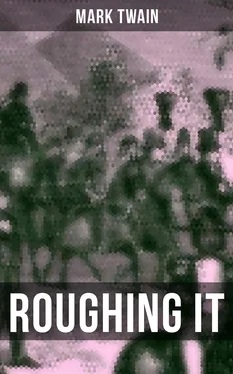And then my newspaper correspondence dropped out, and he took a chance in that — manuscript letters written for the home papers. But he was treading on dangerous ground, now. He began to come across solid wisdom in those documents that was rather weighty on his stomach; and occasionally he would take a joke that would shake him up till it loosened his teeth; it was getting to be perilous times with him, but he held his grip with good courage and hopefully, till at last he began to stumble on statements that not even a camel could swallow with impunity. He began to gag and gasp, and his eyes to stand out, and his forelegs to spread, and in about a quarter of a minute he fell over as stiff as a carpenter’s work-bench, and died a death of indescribable agony. I went and pulled the manuscript out of his mouth, and found that the sensitive creature had choked to death on one of the mildest and gentlest statements of fact that I ever laid before a trusting public.
I was about to say, when diverted from my subject, that occasionally one finds sage-bushes five or six feet high, and with a spread of branch and foliage in proportion, but two or two and a half feet is the usual height.
Table of Contents
As the sun went down and the evening chill came on, we made preparation for bed. We stirred up the hard leather letter-sacks, and the knotty canvas bags of printed matter (knotty and uneven because of projecting ends and corners of magazines, boxes and books). We stirred them up and redisposed them in such a way as to make our bed as level as possible. And we did improve it, too, though after all our work it had an upheaved and billowy look about it, like a little piece of a stormy sea. Next we hunted up our boots from odd nooks among the mail-bags where they had settled, and put them on. Then we got down our coats, vests, pantaloons and heavy woolen shirts, from the arm-loops where they had been swinging all day, and clothed ourselves in them — for, there being no ladies either at the stations or in the coach, and the weather being hot, we had looked to our comfort by stripping to our underclothing, at nine o’clock in the morning. All things being now ready, we stowed the uneasy Dictionary where it would lie as quiet as possible, and placed the water-canteens and pistols where we could find them in the dark. Then we smoked a final pipe, and swapped a final yarn; after which, we put the pipes, tobacco and bag of coin in snug holes and caves among the mail-bags, and then fastened down the coach curtains all around, and made the place as “dark as the inside of a cow,” as the conductor phrased it in his picturesque way. It was certainly as dark as any place could be — nothing was even dimly visible in it. And finally, we rolled ourselves up like silkworms, each person in his own blanket, and sank peacefully to sleep.
Whenever the stage stopped to change horses, we would wake up, and try to recollect where we were — and succeed — and in a minute or two the stage would be off again, and we likewise. We began to get into country, now, threaded here and there with little streams. These had high, steep banks on each side, and every time we flew down one bank and scrambled up the other, our party inside got mixed somewhat. First we would all be down in a pile at the forward end of the stage, nearly in a sitting posture, and in a second we would shoot to the other end, and stand on our heads. And we would sprawl and kick, too, and ward off ends and corners of mail-bags that came lumbering over us and about us; and as the dust rose from the tumult, we would all sneeze in chorus, and the majority of us would grumble, and probably say some hasty thing, like: “Take your elbow out of my ribs! — can’t you quit crowding?”
Every time we avalanched from one end of the stage to the other, the Unabridged Dictionary would come too; and every time it came it damaged somebody. One trip it “barked” the Secretary’s elbow; the next trip it hurt me in the stomach, and the third it tilted Bemis’s nose up till he could look down his nostrils — he said. The pistols and coin soon settled to the bottom, but the pipes, pipe-stems, tobacco and canteens clattered and floundered after the Dictionary every time it made an assault on us, and aided and abetted the book by spilling tobacco in our eyes, and water down our backs.
Still, all things considered, it was a very comfortable night. It wore gradually away, and when at last a cold gray light was visible through the puckers and chinks in the curtains, we yawned and stretched with satisfaction, shed our cocoons, and felt that we had slept as much as was necessary. By and by, as the sun rose up and warmed the world, we pulled off our clothes and got ready for breakfast. We were just pleasantly in time, for five minutes afterward the driver sent the weird music of his bugle winding over the grassy solitudes, and presently we detected a low hut or two in the distance. Then the rattling of the coach, the clatter of our six horses’ hoofs, and the driver’s crisp commands, awoke to a louder and stronger emphasis, and we went sweeping down on the station at our smartest speed. It was fascinating — that old overland stagecoaching.
We jumped out in undress uniform. The driver tossed his gathered reins out on the ground, gaped and stretched complacently, drew off his heavy buckskin gloves with great deliberation and insufferable dignity — taking not the slightest notice of a dozen solicitous inquires after his health, and humbly facetious and flattering accostings, and obsequious tenders of service, from five or six hairy and half-civilized station-keepers and hostlers who were nimbly unhitching our steeds and bringing the fresh team out of the stables — for in the eyes of the stage-driver of that day, station-keepers and hostlers were a sort of good enough low creatures, useful in their place, and helping to make up a world, but not the kind of beings which a person of distinction could afford to concern himself with; while, on the contrary, in the eyes of the station-keeper and the hostler, the stage-driver was a hero — a great and shining dignitary, the world’s favorite son, the envy of the people, the observed of the nations. When they spoke to him they received his insolent silence meekly, and as being the natural and proper conduct of so great a man; when he opened his lips they all hung on his words with admiration (he never honored a particular individual with a remark, but addressed it with a broad generality to the horses, the stables, the surrounding country and the human underlings); when he discharged a facetious insulting personality at a hostler, that hostler was happy for the day; when he uttered his one jest — old as the hills, coarse, profane, witless, and inflicted on the same audience, in the same language, every time his coach drove up there — the varlets roared, and slapped their thighs, and swore it was the best thing they’d ever heard in all their lives. And how they would fly around when he wanted a basin of water, a gourd of the same, or a light for his pipe! — but they would instantly insult a passenger if he so far forgot himself as to crave a favor at their hands. They could do that sort of insolence as well as the driver they copied it from — for, let it be borne in mind, the overland driver had but little less contempt for his passengers than he had for his hostlers.
The hostlers and station-keepers treated the really powerful conductor of the coach merely with the best of what was their idea of civility, but the driver was the only being they bowed down to and worshipped. How admiringly they would gaze up at him in his high seat as he gloved himself with lingering deliberation, while some happy hostler held the bunch of reins aloft, and waited patiently for him to take it! And how they would bombard him with glorifying ejaculations as he cracked his long whip and went careering away.
Читать дальше












